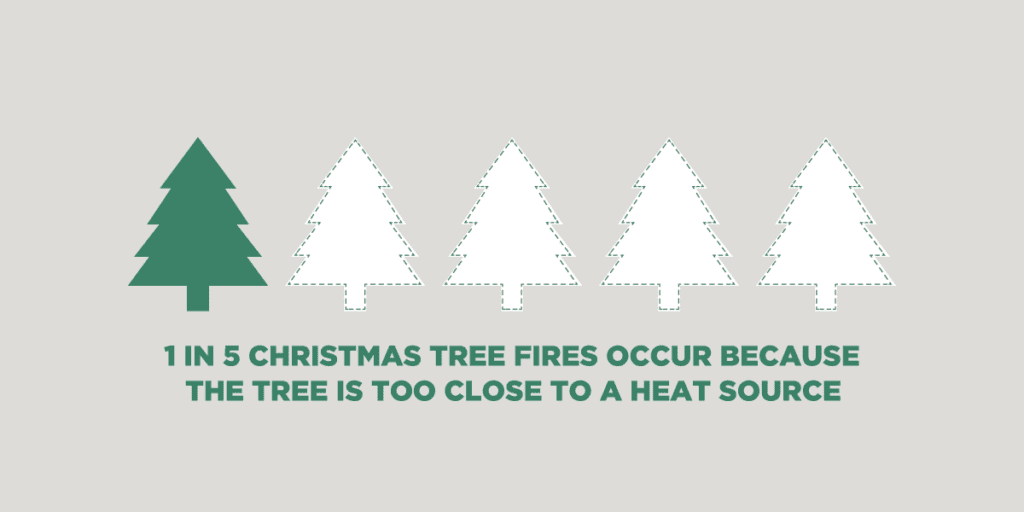

O inverno oferece muitas coisas pelas quais se pode esperar - noites aconchegantes com um cobertor e um livro, correr na neve e depois entrar para tomar uma xícara de chocolate quente, um fogo na lareira durante as festas de fim de ano. Embora todas essas coisas criem ótimas lembranças, não se esqueça de pensar na segurança contra incêndios.
Ao preparar sua casa para o inverno, considere como os meses mais frios podem levar a riscos únicos de incêndio. Aqui estão algumas sugestões para Mantenha sua casa segura contra incêndios o tempo todo, mas especialmente durante o inverno.
Segurança contra incêndios no inverno
Metade de todas as residências aquecimento de incêndios ocorrem em dezembro, janeiro e fevereiro, portanto, verifique se está mantendo sua casa segura antes que a neve realmente comece a cair.
Check-up mensal. Com o aquecedor ligado e as janelas fechadas, é uma boa ideia verificar os detectores de monóxido de carbono pelo menos uma vez por mês para saber se estão funcionando como deveriam.
Não sobrecarregue uma tomada. Aparelhos que produzem calor, como aquecedores de ambiente, consomem muita eletricidade. Portanto, é importante que não haja mais de um ligado em uma tomada específica ao mesmo tempo. Caso contrário, você poderá sobrecarregar o circuito e provocar um incêndio.
Os geradores precisam ficar do lado de fora. Quando falta energia durante as tempestades de inverno, muitas pessoas recorrem a geradores para manter suas luzes e sistemas de aquecimento em funcionamento. Mas é fundamental lembrar que os geradores precisam correr ao ar livre. Se um gerador for usado em ambientes fechados, ele pode inundar a casa com monóxido de carbono em minutos e colocar todos os que estiverem dentro dela em risco de envenenamento por monóxido de carbono.
Não deixe que seus canos congelem. Se os canos de sua casa congelamSe o encanamento estiver muito frio, ele pode estourar e causar danos catastróficos que podem ser caros para consertar. Para evitar que isso aconteça, mantenha os termostatos de sua casa a 55 graus ou mais, elimine fontes de ar frio próximas às linhas de água, como correntes de ar de portas ou janelas e, se necessário, envolva os canos com isolamento. Se o tempo permanecer abaixo de zero, mantenha a água em movimento, permitindo que um fio de água passe por ela.
>> 5 passos a serem dados depois de bater a cabeça


Foco na lareira
De acordo com a Agência de Proteção Ambiental dos EUA, 87% dos aquecimento de edifícios residenciais incêndios ocorrem em incêndios iniciados em chaminés, chaminés ou queimadores de combustão. O principal fator para esses incêndios foi a falta de limpeza dos equipamentos, principalmente das chaminés.
Uma boa maneira de diminuir a probabilidade de um problema é pedir a um profissional qualificado que limpe e inspecione a chaminé e as aberturas de ventilação uma vez por ano. A maioria incêndios em chaminés ocorrem quando o creosoto, um subproduto da queima da madeira, se acumula dentro da chaminé.
Em geral, certifique-se de acompanhar a limpeza seguindo alguns passos segurança básica para lareiras regras.
- Queime somente madeira seca e limpa.
- Não use líquidos inflamáveis para iniciar um incêndio.
- Verifique se o registro está aberto antes do uso para que a fumaça e o monóxido de carbono não retornem para dentro da casa.
- Use uma tela de lareira para que as faíscas e as brasas não saiam da lareira.
>> Dicas de segurança para decoração sazonal


Segurança contra incêndios durante todo o ano
1. Verifique os alarmes de fumaça
Alarmes de fumaça são legalmente exigidos em todos os andares da casa e perto de quartos ou áreas de dormir.Certifique-se de testar os alarmes todos os meses e substituir as baterias pelo menos uma vez por ano.
2. Crie um plano de fuga
Crie um plano de fuga para a família. Certifique-se de que todos os membros da família conheçam suas funções em caso de incêndio, identificando duas saídas por cômodo e um ponto de encontro ao ar livre. Pratique as evacuações diurnas e noturnas, com o objetivo de reduzir o tempo para menos de dois minutos. Designe alguém para supervisionar a evacuação segura de bebês, crianças pequenas ou animais de estimação, com uma pessoa de reserva, se necessário.
3. Cozinhe com cuidado
Utilize um termômetro para evitar o superaquecimento do óleo e a ocorrência de incêndios na graxa. Mantenha uma tampa por perto para abafar as chamas caso ocorra um incêndio com graxa e nunca use água para apagá-lo.
4. Descarte os cigarros adequadamente
Fumar sem cuidado é a principal causa de mortes relacionadas a incêndios na América do Norte. Não fume na cama ou quando estiver sonolento. Um cigarro perdido ou derrubado pode causar incêndios.Certifique-se de que as bitucas de cigarro estejam molhadas com água antes de serem descartadas.
Outras dicas úteis:
- Monitore os aparelhos e os cabos elétricos.
- Ao cozinhar, os utensílios de madeira ou plástico têm menos probabilidade de conduzir o calor e causar queimaduras, e mantenha luvas de forno ou pegadores de panela à mão para proteger suas mãos.
- Guarde todos os fósforos e isqueiros em um local alto, onde as crianças não possam vê-los ou alcançá-los.
- Use um aquecedor de ambiente de qualidade e coloque-o em uma superfície estável e plana.
- Nunca deixe o aquecedor de ambiente funcionando sem supervisão.
>> 6 dicas de segurança contra incêndio que você precisa conhecer
A Keches Law pode ajudar
Acidentes acontecem e, se houver negligência, talvez você precise considerar uma ação legal. Veja a seguir o que você deve considerar:
O Keches Law Group tem uma equipe experiente de advogados de danos pessoais que estão prontos para ouvir sua história e orientá-lo no processo. Contate-nos hoje mesmo se você tiver alguma dúvida.



